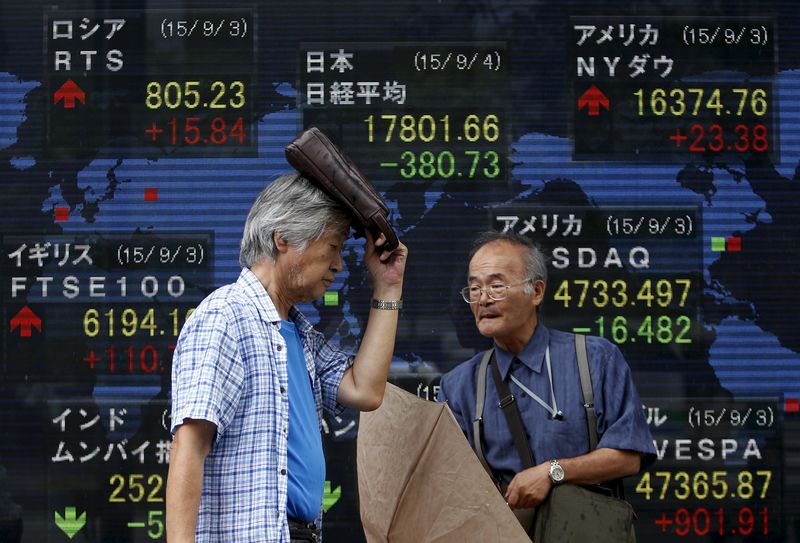By Nichola Saminather
SINGAPORE (Reuters) - Asian shares and emerging currencies fell on Monday after the U.S. Federal Reserve's decision to keep interest rates at record lows raised fresh concerns about growth globally, particularly in China.
European markets were set to follow suit, with financial spreadbetters expecting Britain's FTSE 100 (FTSE) to slip 0.4 percent, Germany's DAX (GDAXI) 0.5 percent, and France's CAC 40 (FCHI) 0.2-0.3 percent.
U.S. stock futures (ESc1) slipped 0.4 percent during the Asian day, suggesting further weakness on Wall Street after major indexes fell more than 1.3 percent on Friday on worries that slower overseas demand will hurt corporate profits. (N)
MSCI's broadest index of Asia-Pacific shares outside Japan (MIAPJ0000PUS) fell 2 percent, with Hong Kong (HSI) down 1.2 percent, Australia (AXJO) 2 percent and South Korea (KS11) 1.6 percent. Japanese markets are shut through Wednesday.
China was the sole Asian market to defy the downtrend, with the Shanghai Composite index (SSEC) up 1.1 percent and the CSI300 (CSI300) rising 1 percent.
Investors will be focusing on flash manufacturing activity readings from China and the eurozone on Wednesday for pointers on where the global economy is heading.
A Reuters poll showed economists expect the flash September China factory PMI headline reading to edge up to 47.5 from a final reading of 47.3 in August.
But it likely remained near 6/1-2-year lows, pointing to a seventh straight contraction in activity on a monthly basis.
"It looks like a continuation of the growth worries that have hampered markets for the last few months now," said Shane Oliver, head of investment strategy at AMP Capital in Sydney.
"European and U.S. shares had sharp falls, after initially benign reactions to the Fed, and this is now flowing through to Asian markets today," he said.
Global markets have recoiled after the Fed opted on Thursday to hold rates steady, saying it would like to see further improvements in U.S. labour markets and inflation and stressing that the global economic outlook appeared less certain.
The U.S. dollar, which retreated after the Fed decision, rose 0.3 percent to 95.365 against a basket of six currencies (DXY) but slipped 0.1 percent to 119.86 yen on Monday.
The euro was little changed at $1.1312.
U.S. and European debt yields also tumbled on Friday, with the policy-sensitive two-year yield (US2YT=RR) falling to 0.678 after hitting a four-and-a-half year high of 0.819 percent earlier in the week.
The 10-year German Bund yield
"The monetary-policy-watcher world has now turned decidedly bearish" after the Fed meeting, Evan Lucas, market strategist at trading services provider IG in Melbourne, wrote in a note.
"If emerging market risk, coupled with low-growth European environment is affecting Fed decision making, sentiment uncertainty will amplify," he said.
The resulting safe-haven demand led gold to hold near its highest level in nearly three weeks.
Spot gold
Oil prices climbed as U.S. drilling slowed, after slumping on Friday on the selloff in U.S. stocks.
U.S. crude futures (CLc1) were up 1.3 percent at $45.24 per barrel. Brent futures (LCOc1) rose 1.1 percent to $47.99.
